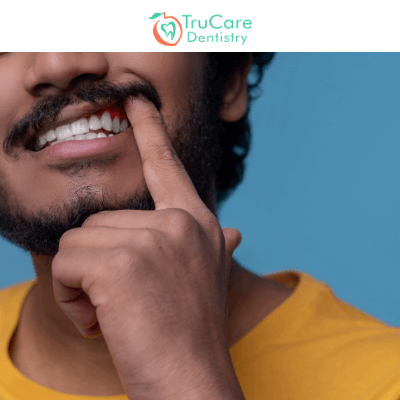
A chipped tooth can be an unsettling experience, causing discomfort and affecting the appearance of your smile. Understanding the causes and available treatments for a chipped tooth is essential to prevent further damage and maintain optimal dental health. This article will explore the grounds of a chipped tooth and the cosmetic dentistry treatments available to restore your smile.
Causes of a Chipped Tooth
Here are several things to remember that can cause your tooth to chip.
- Dental Trauma: One of the most frequent reasons for a chipped tooth is dental trauma. This can occur due to accidents, falls, sports injuries, or any other impact on the mouth. Direct trauma to the teeth can cause chips, cracks, or fractures, compromising the tooth’s structure and integrity.
- Biting Hard Objects: Another cause of chipped teeth is biting or chewing on complex objects like ice, hard candies, pens, or bottle caps. Excessive force during these activities can lead to tooth damage and chipping.
- Tooth Decay: It weakens the tooth structure, making it more prone to chipping. When left untreated, cavities can progress and erode the enamel, cutting teeth susceptible to fractures.
- Poor Oral Hygiene: Neglecting proper oral hygiene practices, such as regular brushing and flossing, can accumulate plaque and tartar. This buildup weakens the tooth enamel, increasing the risk of chipping.
Treatments for a Chipped Tooth
- Dental Bonding: It is a well-liked aesthetic procedure for cracked teeth. It entails applying a tooth-colored resin substance to the chipped area, which molds and polishes it to resemble a natural tooth. The appearance and functionality of the tooth can be restored quickly and affordably using dental bonding.
- Dental Veneers: These are thin, custom-made porcelain or composite resin shells. They are designed to cover the front teeth’ surface, including chipped areas. Veneers provide a natural-looking and durable solution to chipped teeth, improving their appearance and protecting them from further damage.
- Dental Crowns: We can recommend dental crowns where a significant portion of the tooth is chipped or damaged. A height is a cap-like structure that covers the entire tooth, providing strength, protection, and an aesthetically pleasing appearance.
- Teeth grinding: It is also known as bruxism, another significant contributor to chipped teeth. This habit occurs unconsciously during sleep or due to stress and anxiety. The excessive pressure exerted on the teeth can weaken their structure over time, making them more susceptible to chips and fractures.
- Dental Implants: You can consider dental implants if a chipped tooth cannot be restored using conservative treatments, such as bonding or veneers. An implant replaces a lost or badly damaged tooth, offering long-lasting and functional relief. A bespoke dental crown is fastened to the implant.
Effective Tips to Lessen the Risk of Chipping a Tooth
Here are some preventive steps to lessen the risk of chipping a tooth because prevention is always preferable to treatment:
- Maintain an accurate oral hygiene routine: Brush your teeth at least twice and floss daily to keep your teeth and gums healthy. Good oral hygiene helps strengthen your teeth and reduce the risk of damage.
- Wear a mouthguard during sports: If you participate in contact sports or activities with a risk of dental injuries, such as football, basketball, or skateboarding, wear a mouthguard. A custom-fitted mouthguard protects against tooth chipping and other oral injuries.
- Never use your teeth as tools: Your teeth are not made for opening bottles, ripping apart packages, or biting nails; they are made for biting and chewing food. To prevent unnecessary stress, avoid using your teeth as tools that could cause chipping or cracking.
- Be cautious when eating hard or crunchy foods: Foods like ice, hard candies, popcorn kernels, and nuts can be potential culprits for chipping teeth. Exercise caution when consuming these foods; if possible, opt for alternatives less likely to cause damage.
- Don’t grind or clench your teeth: Teeth grinding or clenching, also known as bruxism, can weaken your tooth structure and make them more susceptible to chipping. Contact your dentist if you grind your teeth during sleep or experience jaw tension. They may recommend a custom night guard or suggest stress-reducing techniques to alleviate the issue.
- Visit your dentist regularly: Regular dental check-ups are essential for identifying any dental issues early on. Your dentist can identify signs of tooth wear or weakened areas prone to chipping. They can also guide proper dental care and address any concerns.
- Consider dental treatments for weakened teeth: If you have weakened teeth due to decay, enamel erosion, or previous dental work, discuss with your dentist whether additional protective measures, such as dental bonding or crowns, are necessary. These treatments can strengthen your teeth and help prevent chipping.
Remember, prevention is critical when it comes to protecting your teeth. Following these tips and maintaining good oral health practices can reduce the risk of chipping a tooth and enjoy a healthy, confident smile.
Summing Up!
A chipped tooth can occur for several reasons, including dental trauma, biting complex objects, tooth decay, and poor oral hygiene. Several cosmetic dentistry treatments are available to restore and enhance your smile. Dental bonding, veneers, crowns, and implants are some of the options that can effectively treat chipped teeth. It’s essential to note that getting dental attention as soon as possible after chipping a tooth is crucial. A dentist will evaluate the severity of the chip and recommend the most appropriate treatment option based on your specific situation.
To ensure your new chipped tooth or treat delicate dental problems by the best cosmetic dentist in Roswell, GA, or neighboring areas such as Alpharetta, Dunwoody, Marietta, Milton, Sandy Springs, or Sandy Springs, Woodstock, schedule an appointment at TruCare Dentistry. To know our services, visit our website or call (678) 321-7575.
